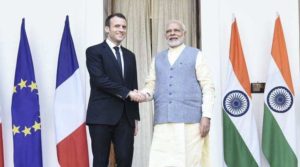
Context
Germany and its European partners are set for a meaningful engagement with Asia. It’s based on an understanding of the region’s geopolitical and economic significance.
Why in news?
The pandemic has upended many certainties. But it has reinforced one major trend in global politics: The rise of Asia. While the global economy crashed in 2020, economies such as Vietnam and China grew. A number of Asia’s open societies have shown us how to successfully contain the virus. And without the leading vaccine exporter, India, the world will not beat the pandemic.
Detailed Analysis
- As an exporting nation, Germany has long observed Asia’s rise through the lens of economic opportunity.
- However, that falls short of the mark today. At the end of the day, the region’s rise has created three Asias. There is the familiar Asia of business — open, dynamic, interconnected.
- However, there is also an Asia of geopolitics, with ever-starker nationalisms, territorial conflicts, arms races and Sino-American rivalry.
- Lastly, we have an Asia of global challenges, without which fair globalisation and getting on top of the pandemic or the climate crisis are impossible.
- These three Asias are increasingly at loggerheads. Geopolitical rivalries threaten free trade.
- The fight against the pandemic is mutating into a systemic competition between democracy and authoritarianism. And frenzied economic growth is fuelling climate change.
- With these dynamics, the region between the African east coast and the US west coast, the Indo-Pacific, will have a decisive impact on the world’s future.
WHAT DOES IT MEAN FOR GERMANY?
- For Germany, this means that we must invest more in this region — not only economically, but also politically.
- To this end, the German government has, for the first time, adopted guidelines for the Indo-Pacific, with which we seek cooperation with all countries of the region: For open economies and free trade; for the fight against pandemics and climate change; and for an inclusive, rules-based order.
- In order to assert these interests, we need the clout of a united Europe. That is why we, together with France and the Netherlands, have commenced work on a European strategy for the Indo-Pacific.
- The strategy is set to be in place by the end of the year, and the EU foreign ministers will begin consultations this month.
- Such a European strategy for the Indo-Pacific must take all three Asias into account. The strategy takes its lead from the Asia of business — the EU and Germany are already well-positioned here.
- Europe is a key trading, technology and investment partner for many countries of the region. Germany alone now conducts one-fifth of its foreign trade with the countries of the Indo-Pacific, and millions of jobs depend on this.
That is why we need to be even more ambitious when it comes to trade. The EU recently concluded groundbreaking free trade agreements with Japan, Singapore and Vietnam that set environmental and social standards.
At the same time, in late 2020, the countries of East and Southeast Asia created the world’s largest free trade area, encompassing one-third of the global economy.
That is why it is time for the EU to swiftly conclude the ongoing negotiations on trade agreements with Australia and New Zealand – and to move forward with negotiations with Indonesia and India.
- In so doing, it will also reduce dependencies, which we have experienced most painfully in the coronavirus crisis.
- Our principle here should be diversification. While it goes without saying that China remains a key economic partner for us, we must not neglect developed economies such as Japan and South Korea or the growth markets of South Asia.
- This also applies to Southeast Asia – Indonesia is this year’s partner country at the Hannover Messe, Germany’s largest industrial fair.
- Together with its Indo-Pacific partners, Europe can set standards for new technologies, human-centred digitisation and sustainable connectivity.
- In this endeavour, Europe can draw on its innovative and economic strength as well as its regulatory power.
- At the EU-India Summit in May, we want to launch a connectivity partnership with India that will further connect India’s and Europe’s digital economies.
- Furthermore, we will hold close consultations with the new administration under US President Joe Biden with a view to ensuring fair market access and investment conditions.
- These steps strengthen an open and interconnected Asia as a motor of the global economy.
Meanwhile, tensions are rising in the Asia of geopolitics. New cold wars or even hot conflicts in the Indo-Pacific would be an economic and political nightmare. Europe must, therefore, take a firmer stand against polarisation and more strongly advocate an inclusive, rules-based Indo-Pacific.
The strategic partnership concluded between the EU and the Association of Southeast Asian Nations (ASEAN)
This connects us with like-minded middle powers. We are underscoring Germany’s interest in cooperation, open shipping routes and respect for international law — the sanctions against North Korea are a case in point — by dispatching a German Navy vessel to the region and signing up to the agreement on combating piracy in Asia.
- Containing geopolitical rivalries in Asia is also a precondition for shaping the future with the Asia of global challenges.
- As the biggest emitters of CO2, the US, China, India and the EU will only win the fight against climate change together.
- The Leaders Summit on Climate that will be hosted by the US next week sets the stage for cooperation. Germany and Europe will stand to benefit from this, as we have been investing in renewable energies, climate protection and biodiversity in the Indo-Pacific for many years.
- Europe and the countries of the Indo-Pacific need each other also in the fight against the virus.
- We are committed to multilateral solutions. The EU is by far the biggest supporter of the international vaccine platform COVAX, and India as a leading producer of vaccines is the most important COVAX supplier.
- Europe will continue to stand up for human rights and democracy in the Indo-Pacific.
- The future of Asia is determined by its people. Europe is ready for a new partnership — a partnership founded on seeking dialogue with the open Asia of business, taming geopolitical rivalry in Asia together and coming up with responses to the world of tomorrow with the Asia of global challenges. This must be the objective of European policy — for and with the Indo-Pacific.

